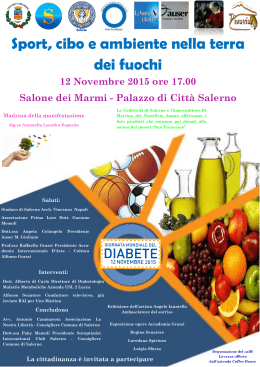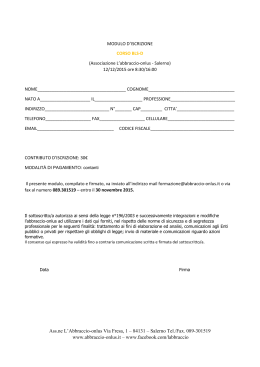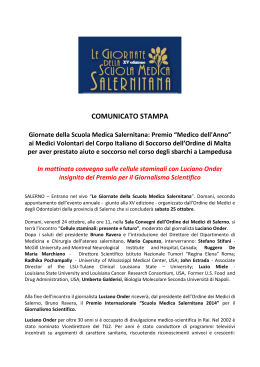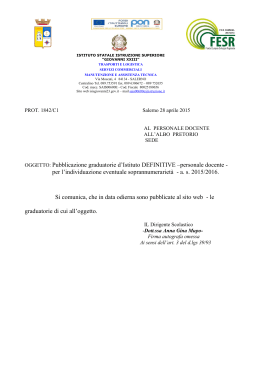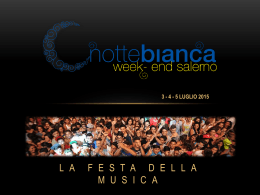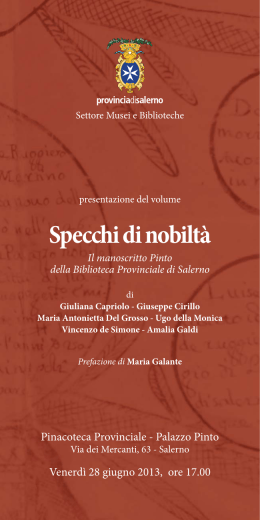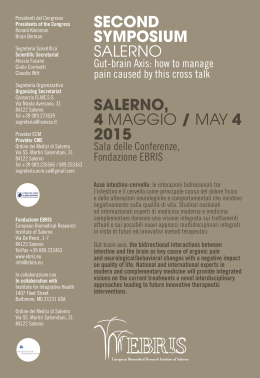itinerari-28pp.indd 1 HI PP OCR AT I C A C I V ITA S 8-02-2010 19:30:54 itinerari-28pp.indd 2 Responsabile del progetto: Fondazione Scuola Medica Salernitana Project presented by: The Salerno Medical School Foundation In collaborazione con la Soprintendenza per i BAP di Salerno e Avellino Con il contributo di 8-02-2010 19:30:55 itinerari-28pp.indd 3 Presentazione Presentation La Fondazione Scuola Medica Salernitana ha strutturato per la città di Salerno due itinerari storico artistici entrambi incentrati sulla Scuola Medica Salernitana, la prima e più importante istituzione medica d’Europa nel Medioevo, considerata come l’antesignana delle moderne università. Per riportare alla luce la Salerno dell’anno mille, si visiteranno musei, strade, vicoli del centro storico che guideranno il visitatore nei luoghi dove l’antica scuola nacque, si sviluppò ed operò, conducendolo, successivamente, ad una collezione più attuale (dal XVII al XX secolo) di storia della medicina e della strumentazione chirurgica custodita nel nuovo Museo Roberto Papi. Nonostante non ci sia uno stretto legame di discendenza cronologica, il Museo Papi ha un forte valore storico-culturale che si ricollega perfettamente alla tradizione locale, fondata sulla celebre presenza della Scuola Medica Salernitana. The Salerno Medical School Foundation has constructed two historical art itineraries centred around the Salerno Medical School, the first and most important medical institute of Medieval Europe and considered the forerunner of the modern university. A visit round the museums, streets and the narrow backstreets of the historical centre will bring back to life the Salerno of the year one thousand and will guide the visitor from the Western world’s most famous source of medical science – the Salerno Medical School – to a more modern collection (17th - 20th century) of medical history and the history of surgical instruments kept in the new Roberto Papi Museum. Despite there being no close chronological link, the Papi Museum has a strong historicalcultural value which fits in perfectly with its local formation founded on the presence of the famous Salerno Medical School. 3 8-02-2010 19:30:55 itinerari-28pp.indd 4 8-02-2010 19:30:56 itinerari-28pp.indd 5 Itinerario 1 Salerno e la sua Scuola Medica I l primo itinerario “Salerno e la sua Scuola Medica” permette al visitatore, in una durata di circa due ore, di conoscere Salerno e la sua Scuola attraverso tappe mirate ma significative. Via Mercanti Il percorso storico-culturale per rivivere e riportare alla luce la Salerno medievale, potrebbe partire proprio da questa strada, dove sorge il Museo Virtuale della Scuola Medica Salernitana per poi addentrarsi tra i vicoli del centro storico, passando per la Cattedrale fino a raggiungere il famoso Orto Botanico detto “Giardino della Minerva” e, successivamente, anche per un ordine cronologico, l’ultima meta, il Museo Roberto Papi. Nel 644 d.C., durante le invasioni barbariche, Salerno fu occupata dai Longobardi che le riconobbero però piena dignità. Nel 762 Salerno divenne Principato, retto dal Duca di Benevento, Arechi II, che fu incoronato Principe di Salerno. Il Principato durò oltre 750 anni e durante il suo dominio realizzò la propria corte con mura e torri fortificando la città. ItinerarY 1 Salerno and its Medical School The first itinerary, “Salerno and its Medical School” allows the visitor, in the space of about two hours, to come to know Salerno and its School through a series of specific and meaningful stages. Via Mercanti The historical-cultural route which brings medieval Salerno back to life starts with the Cyber Museum of the Salerno Medical School and then progresses through the back streets of the historical centre, passing by the Cathedral and continuing, also following a chronological order, to the final destination, the Roberto Papi Museum. In 644 AD, during the barbaric invasions, Salerno was occupied by the Lombardi who, however, did actually give full recognition to the city. In 762 Salerno became a principality, held by the Duke of Benevento, Arechi II, who was crowned Prince in Salerno. The principality lasted more than 750 years and during its dominion constructed its court with walls and towers to fortify the city. 5 8-02-2010 19:30:56 itinerari-28pp.indd 6 8-02-2010 19:30:58 itinerari-28pp.indd 7 Itinerario 1 Salerno e la sua Scuola Medica Museo Virtuale Scuola Medica Salernitana Situato nel cuore del centro storico, in via Mercanti, il Museo è stato realizzato dalla Soprintendenza BAP di Salerno e Avellino nell’ex chiesa di San Gregorio, per presentare con l’uso delle tecnologie informatiche più avanzate, la storia, i protagonisti, le tematiche, i testi della Scuola Medica Salernitana, rintracciati nelle più importanti biblioteche europee e, per la prima volta, organicamente presentati. ItinerarY 1 Salerno and its Medical School Cyber Museum Salerno School Of Medicine Situated in the heart of the historical centre in Via Mercanti, the museum was realized in the former church of Saint Gregory by the Monuments and Fine Arts Bureau of Salerno and Avellino and uses advanced computer technology to present history, protagonists, themes and texts of the Salerno Medical School. 7 8-02-2010 19:31:00 itinerari-28pp.indd 8 8-02-2010 19:31:03 itinerari-28pp.indd 9 Itinerario 1 Salerno e la sua Scuola Medica Via Trotula de Ruggiero e Museo di Storia della Medicina e della Strumentazione Chirurgica “Roberto Papi” Il Museo sorge nello splendido palazzo Galdieri sito in via Trotula de Ruggiero, una strada con un nome significativo che segna ancor più l’importanza e i meriti ricoperti dall’insigne Scuola Medica Salernitana. La Scuola Medica oltre ad essere stata la più antica scuola medica d’Europa, è stata la prima ad aprire la strada per l’emancipazione femminile nelle attività professionali. Trotula de Ruggiero, nobile salernitana, vissuta nel XI secolo presso la corte longobarda di Guaimario IV, fu la prima donna medico famosa per aver scritto il trattato di ginecologia De mulierum passionibus ed il primo libro di cosmesi femminile, il De ornatu. Le sue conoscenze in campo ginecologico furono straordinarie e molte donne ricorsero alle sue cure. Da tale via si accede al Giardino della Minerva, luogo di formazione di questa illustre “Schola”. ItinerarY 1 Salerno and its Medical School Via Trotula de Ruggiero and the Roberto Papi Museum for the history of medicine and surgical instruments The museum can be found in the splendid Galdieri Building, situated in Via Trotula de Ruggiero, a road with a significant name which marks the importance and the merits of the Salerno Medical School. The Medical School, besides being the oldest school of medicine in Europe, was also the first to open the road to female emancipation in professional activities. Trotula de Ruggiero, a Noble Lady from Salerno who lived in the 11th century and was part of the Lombard court of Guaimario IV, was the first female doctor and was famous for having written the gynaecological treatise De mulierum passionibus and the first book on female cosmetics, De ornatu. Her knowledge in the gynaecological field was extraordinary and many women went to her to be treated. This road then leads to the Minerva Gardens, the 9 place where this famous “Schola” had her formation. 8-02-2010 19:31:04 itinerari-28pp.indd 10 8-02-2010 19:31:07 Itinerario 1 Salerno e la sua Scuola Medica Il Museo della storia della medicina e della strumentazione chirurgica presenta una collezione di oggetti appartenenti a quasi tutte le branche della medicina. Sono stati ricostruiti, per accogliere questa ricca collezione, ambienti originali che rappresentano scene di vita medica. ItinerarY 1 itinerari-28pp.indd 11 Salerno and its Medical School The museum for the history of medicine and surgical instruments presents a collection of objects belonging to almost every field of medicine. The original environment has been reconstructed to accommodate this rich collection which represents scenes of medical life. 11 8-02-2010 19:31:09 itinerari-28pp.indd 12 8-02-2010 19:31:10 Itinerario 1 Salerno e la sua Scuola Medica Giardino della Minerva Il Giardino della Minerva si trova nel cuore del centro antico di Salerno, in una zona denominata nel Medioevo “Plaium montis”, a metà strada di un ideale percorso che si sviluppa lungo l‘asse degli orti cinti e terrazzati. L’orto botanico di cui si ha memoria, fu realizzato da Matteo Silvatico, illustre esponente della Scuola Medica Salernitana, tra il XIII ed il XIV secolo. Nello splendido scenario del Giardino della Minerva, sulla panoramica terrazza, di fianco alla fontana monumentale, si possono degustare decotti, infusi, macerati, aperitivi e biscotti tipici proposti dall’Associazione Culturale Nemus che gestisce la tisaneria comunale del Giardino della Minerva. ItinerarY 1 itinerari-28pp.indd 13 Salerno and its Medical School The Minerva Gardens The Minerva Gardens are in the heart of the ancient centre of Salerno, in an area which was called “Plaium montis” during medieval times, and half way along an imaginary route that follows the axis of the walled and terraced gardens. The botanical gardens of which we have memory were constructed by Matteo Silvatico, a famous exponent of the Salerno Medical School, between the 18th and 19th centuries. In the splendid scenery of the Minerva Gardens, on the magnificent panoramic terrace next to the monumental fountain, you can taste herbal teas, drinks and local biscuits offered by the Cultural Association, Nemus, which runs the tea house of the Minerva Gardens on behalf of the local council. 13 8-02-2010 19:31:11 itinerari-28pp.indd 14 8-02-2010 19:31:12 Itinerario 2 Sulle tracce della Scuola Medica Salernitana I l secondo itinerario “Sulle tracce della Scuola Medica Salernitana” conduce il visitatore, in una durata di circa tre ore, in tutti i luoghi legati alla Salerno Medioevale ed alla memoria della sua Scuola. Via Mercanti Il percorso storico-culturale per rivivere la Salerno medievale, parte da questa strada, sede del Museo Virtuale della Scuola Medica e si addentra tra i vicoli del centro storico, passando per la Cattedrale fino a raggiungere il Museo Roberto Papi ed il Giardino della Minerva. ItinerarY 2 Tracing the history of the Salerno Medical School The second itinerary “Tracing the history of the Salerno Medical School” takes the visitor, for a duration of about three hours, to all the places linked to the memory of the Salerno Medical School. Via Mercanti The historical-cultural route which brings medieval Salerno back to life starts with the Cyber Museum of the Salerno Medical School and then progresses through the back streets of the historical centre, passing by the Cathedral and continuing, also following a chronological order, to the final destination, the Roberto Papi Museum and the Minerva Gardens. Museo Virtuale Scuola Medica Salernitana Situato nel cuore del centro storico, in via Mercanti, il Museo è stato realizzato dalla Soprintendenza BAP di Salerno e Avellino nell’ex chiesa di San Gregorio, per presentare con l’uso delle tecnologie informatiche più avanzate, la storia, i protagonisti, le tematiche, i testi della Scuola Medica Salernitana. itinerari-28pp.indd 15 Cyber Museum, Salerno Medical School Situated in the heart of the historical centre, in Via Mercanti, the museum was founded in the former church of Saint Gregory and uses advanced computer technology to present history, protagonists, themes and texts of the Salerno Medical School. 15 8-02-2010 19:31:12 itinerari-28pp.indd 16 8-02-2010 19:31:13 Itinerario 2 Sulle tracce della Scuola Medica Salernitana Cattedrale di San Matteo La cattedrale fondata da Roberto il Guiscardo, venne consacrata nel luglio del 1084 da Papa Gregorio VII rifugiatosi a Salerno. E’ esemplata sul modello della chiesa abbaziale di Desiderio a Montecassino, con una pianta di tipo basilicale composta da tre navate longitudinali, transetto ed un quadriportico. Itinerary 2 Tracing the history of the Salerno Medical School Saint Mathew’s Cathedral The cathedral was founded by Roberto Guiscardo and was consecrated in July 1084 by Pope Gregorio VII who was in refuge in Salerno at the time. It was built on the model of the abbey church of Desiderio in Montecassino, with the typical basilica plan of three longitudinal naves, transept and an entrance courtyard.. Resti del Castel Terracena Il Palazzo fu costruito per volere di Roberto il Guiscardo dal 1076 al 1080. Sorgeva a ridosso delle mura orientali della città, sulla sommità di un’altura. La scelta del luogo fu certamente dettata dalla presenza, nelle immediate vicinanze, della cattedrale, voluta dallo stesso Roberto. Notevoli le decorazioni in tufo che ricordano quelle del quadriportico del Duomo. The remain of the Terracena Castle The palace was built by Robert Guiscardo between 1076 and 1080. It stands over the eastern walls of the city, on a hilltop. The choice of the site was certainly dictated by the presence of the cathedral in the immediate vicinity. To be noted are the decorations in tuff that are similar to those on the hall doors of the cathedral. itinerari-28pp.indd 17 8-02-2010 19:31:14 itinerari-28pp.indd 18 8-02-2010 19:31:17 Itinerario 2 Sulle tracce della Scuola Medica Salernitana Chiesa di San Benedetto La chiesa all’origine era parte dell’omonimo monastero fondato probabilmente nei secoli VII-VIII; ad esso era collegato l’imponente acquedotto, le cui tracce più evidenti sono visibili in via Arce. Itinerary 2 Tracing the history of the Salerno Medical School Saint Benedict’s Church The church was first part of the homonymous monastery founded probably between the 7th and 8th centuries; it was linked to the large aqueduct, the traces of which are still visible in Via Arce. Museo Roberto Papi Il Museo della storia della medicina e della strumentazione chirurgica presenta una collezione di oggetti appartenenti a quasi tutte le branche della medicina. Sono stati ricostruiti, per accogliere questa ricca collezione, ambienti originali che rappresentano scene di vita medica. itinerari-28pp.indd 19 The Roberto Papi Museum The museum for the history of medicine and surgical instruments presents a collection of objects belonging to almost every field of medicine. The original environment has been reconstructed to accommodate this rich collection which represents scenes of medical life. 19 8-02-2010 19:31:19 itinerari-28pp.indd 20 8-02-2010 19:31:22 Itinerario 2 Sulle tracce della Scuola Medica Salernitana Via Trotula de Ruggiero e Museo di Storia della Medicina e della Strumentazione Chirurgica “Roberto Papi” Il Museo sorge nello splendido palazzo Galdieri sito in via Trotula de Ruggiero, una strada con un nome significativo che segna ancor più l’importanza e i meriti ricoperti dall’insigne Scuola Medica Salernitana. La Scuola Medica oltre ad essere stata la più antica scuola medica d’Europa, è stata la prima ad aprire la strada per l’emancipazione femminile nelle attività professionali. Trotula de Ruggiero, nobile salernitana, vissuta nel XI secolo presso la corte longobarda di Guaimario IV, fu la prima donna medico famosa per aver scritto il trattato di ginecologia De mulierum passionibus ed il primo libro di cosmesi femminile, il De ornatu. Le sue conoscenze in campo ginecologico furono straordinarie e molte donne ricorsero alle sue cure. Da tale via si accede al Giardino della Minerva, luogo di formazione di questa illustre “Schola”. itinerari-28pp.indd 21 Itinerary 2 Tracing the history of the Salerno Medical School Via Trotula de Ruggiero and the Roberto Papi Museum for the history of medicine and surgical instruments The museum can be found in the splendid Galdieri Building, situated in Via Trotula de Ruggiero, a road with a significant name which marks the importance and the merits of the Salerno Medical School. The Medical School, besides being the oldest school of medicine in Europe, was also the first to open the road to female emancipation in professional activities. Trotula de Ruggiero, a Noble Lady from Salerno who lived in the 11th century and was part of the Lombard court of Guaimario IV, was the first female doctor and was famous for having written the gynaecological treatise De mulierum passionibus and the first book on female cosmetics, De ornatu. Her knowledge in the gynaecological field was extraordinary and many women went to her to be treated. This road then leads to the Minerva Gardens, the place where this famous “Schola” had her formation. 21 8-02-2010 19:31:23 itinerari-28pp.indd 22 8-02-2010 19:31:26 Itinerario 2 Sulle tracce della Scuola Medica Salernitana San Pietro a Corte Il complesso di San Pietro a corte fu fondato da Arechi II, divenuto principe all’indomani della caduta del Regno longobardo per mano di Carlo Magno. La chiesa costituisce la più importante fondazione longobarda esistente in città. Il sito presenta un’interessante stratigrafia archeologica che parte dall’ambiente del frigidarium delle terme romane fino all’alta cappella palatina. itinerari-28pp.indd 23 Itinerary 2 Tracing the history of the Salerno Medical School Saint Peter’s Court The Saint Peter’s Court complex was founded by Arechi II, who became prince after the fall of the Lombard kingdom at the hand of Charlemagne. The church is the most important Lombard foundation existing in the city. The site presents an interesting archaeological stratification starting from the frigidarium ambient of the roman spas up to the high palatine chapel. 23 8-02-2010 19:31:28 itinerari-28pp.indd 24 8-02-2010 19:31:29 Itinerario 2 Sulle tracce della Scuola Medica Salernitana Giardino della Minerva Il Giardino della Minerva si trova nel cuore del centro antico di Salerno, in una zona denominata nel Medioevo “Plaium montis”, a metà strada di un ideale percorso che si sviluppa lungo l‘asse degli orti cinti e terrazzati. L’orto botanico fu realizzato da Matteo Silvatico, illustre esponente della Scuola Medica Salernitana, tra il XIII ed il XIV secolo. Nello splendido scenario del Giardino della Minerva, sulla panoramica terrazza, di fianco alla fontana monumentale, si possono degustare decotti, infusi, macerati, aperitivi e biscotti tipici proposti dall’Associazione Culturale Nemus che gestisce la tisaneria comunale del Giardino della Minerva. itinerari-28pp.indd 25 Itinerary 2 Tracing the history of the Salerno Medical School The Minerva Gardens The Minerva Gardens are in the heart of the ancient centre of Salerno, in an area which during medieval times was called “Plaium montis”, and half way along an imaginary route that follows the axis of the walled and terraced gardens. The botanical gardens of which we have memory were constructed by Matteo Silvatico, a famous exponent of the Salerno Medical School, between the 18th and 19th centuries. In the splendid scenery of the Minerva Gardens, on the magnificent panoramic terrace next to the monumental fountain, you can taste herbal teas, drinks and local biscuits offered by the Cultural Association, Nemus, which runs the tea house of the Minerva Gardens on behalf of the local council. 25 8-02-2010 19:31:30 itinerari-28pp.indd 26 8-02-2010 19:31:31 Itinerario 2 provincia di salerno Sulle tracce della Scuola Medica Salernitana Castello Arechi Dal Giardino, attraverso un sentiero che risale il “Plaium Montis” si raggiunge il Castello. La struttura, fondata nel corso del VI secolo, fu restaurata in epoca longobarda da Arechi II che trasferì la capitale del ducato da Benevento a Salerno, scegliendo come fulcro il castello che si eleva a 300 m sul livello del mare sulla cima del monte Bonadies. All’interno del castello è possibile visitare il museo che raccoglie i materiali provenienti dalle campagne di scavi archeologici, mentre il settore delle cannoniere ospita delle istallazione multimediali. itinerari-28pp.indd 27 Itinerary 2 Tracing the history of the Salerno Medical School The Arechi Castle Leaving the Gardens and following a path that climbs the “Plaium Montis” you reach the Castle. Founded during the 6th century, it was restructured in the Lombard period by Arechi II who transferred the capital of the duchy from Benevento to Salerno, making a fulcrum of this castle which is over 300m above sea level on the top of Mount Bonadies. Inside the castle you can visit the museum which holds material from archaeological sites in the surrounding 27 countryside while the cannon sector holds multi-medial installations. 8-02-2010 19:31:32 PER INFORMAZIONI E PRENOTAZIONI: Emanuela Adinolfi cell. 3393153399 [email protected] Valentina de Ferrante cell. 328 8957570 [email protected] Museo Roberto Papi - Collezione di Storia della Medicina e della Strumentazione Chirurgica Tel. 089253190 www.museopapi.org [email protected] Orari Museo: Martedì, giovedì, sabato e domenica dalle 9.00 alle 13.30 lunedì chiuso Mercoledì, venerdì dalle 15.00 alle 18.30 Orario estivo dal 1 maggio al 30 settembre: mercoledì, venerdì dalle 17.00 alle 20.00 Orari Giardino della Minerva Tutti i giorni escluso il lunedì dalle 9.00 alle 13.00 Orario estivo dal 1 maggio al 30 settembre: dalle 10.00 alle 13.00 e dalle 17.00 alle 20.00 tutti i giorni tranne il lunedì Tel. 089 252423 - www.giardinodellaminerva.it Orari Museo Virtuale Scuola Medica Salernitana Da martedì a domenica 9.00-13.30 Info e prenotazioni: Tel. 089 2573213/228/227 - cell. 339 5765597 www.lascuolamedicasalernitana.beniculturali.it FOR INFORMATION AND BOOKINGS: Emanuela Adinolfi mobile 339 3153399 [email protected] Valentina de Ferrante mobile 328 8957570 [email protected] Roberto Papi Museum – Collection of Medical and History and the History of Surgical Instruments Tel. 089253190 www.museopapi.org [email protected] Museum opening times: Tuesday, Thursday, Saturday and Sunday from 9.00am to 1.30pm – Monday closed Wednesday, Friday from 3.00pm to 6.30pm Summer times from 1st May to 30th September: Wednesday, Friday from 5.00pm to 8.00pm MINERVA GARDENS OPENING TIMES Every day except Monday from 9.00am to 1.00pm Summer times from 1st May to 30 September from 10.00am to 1.00pm and from 5.00pm to 8.00pm every day except Monday Tel. 089 252423 - www.giardinodellaminerva.it OPENING HOURS VIRTUAL MUSEUM Tuesday to Sunday 9.00am to 13.30pm Tel. +39 089 2573213/228/227 - mobile 339 5765597 www.lascuolamedicasalernitana.beniculturali.it itinerari-28pp.indd 28 8-02-2010 19:31:33
Scaricare
